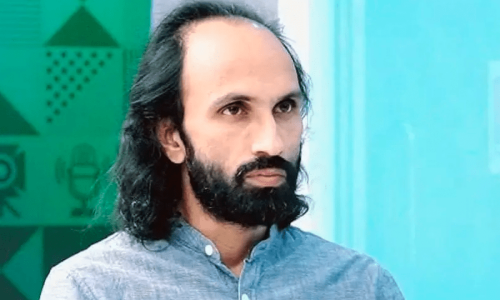ISLAMABAD: A counsel defending the 18th and 21st amendments on behalf of the federal government has termed the original 1973 Constitution “infinitely inferior” to what exists now as the earlier one was an uneasy marriage between Islamic concepts and socialism.
“The 1973 Constitution is an uneasy marriage between Islam and socialism which will never succeed,” senior advocate Khalid Anwar argued before a 17-judge bench of the Supreme Court headed by Chief Justice Nasir-ul-Mulk.
Also read: SC judge says Constitution has concept of basic structure
The full court is hearing a set of petitions challenging the appointment procedure of superior court judges under the 18th Amendment and establishment of military courts under the 21st Amendment to try hardened terrorists.
While the preamble of the Constitution under Article 2 enunciated about the Islamic doctrine of sovereignty, Mr Anwar said, Article 3 was the exact reproduction of Article 12 of the USSR’s 1936 constitution which asked for the elimination of exploitation and gradual fulfilment of the fundamental principle.
He recalled that with the consent of minority parties the founders of the 1973 Constitution were the PPP which had won the elections on the basis of a popular slogan “roti, kapra aur makan” (food, clothes and shelter) which revolved around the concept of socialism, and not religion.
“Should we say then socialism is the basic structure of the Constitution,” the counsel said, adding that the concept of socialism was derived from Marxism which hated religions and held them to be opium for the people.
“The present constitution is far, far superior than the earlier 1973 Constitution the credit of which goes partly to the Supreme Court as well as parliament,” he said.
The preamble of the Constitution, Mr Anwar emphasised, stated that sovereignty over the entire universe belonged to Allah Almighty and had to be exercised through the will of the people and not that of any institution through the chosen and not appointed representatives of the people to realise the principles of democracy, freedom, equality, tolerance and independence of judiciary.
“These are the aspirations and hopes framed by the framers of the Constitution,” he said, adding that the independence of judiciary did not mean increasing the powers of the judiciary but to keep it away from the influence of the executive and legislative wings.
Justice Sheikh Azmat Saeed, a member of the bench, asked the counsel to refer to the speeches of Quaid-i-Azam Mohammad Ali Jinnah, instead of theories of Karl Marx and Lenin, and say whether he was trying to suggest abrogation of the Constitution.
“For God’s sake, we should not be fixated with the past since the basic structure concept has neither been workable nor will it work,” the counsel retorted.
Justice Jawwad S. Khawaja observed that as judges “we have taken oath to the Constitution and whether the basic structure exists or not, or the Constitution was good or bad, we cannot simply rubbish it”. “It’s a judgment call that the 1973 Constitution is inferior,” he observed.
Justice Ejaz Afzal cited the letters written by Dr Allama Iqbal to the Quaid-i-Azam and said that the concept of equalitarian society as emphasised upon in the letters was part of Islam.
Khalid Anwar said he wondered why military courts could not coexist in Pakistan when the same survived in the United States despite the fact that the US Supreme Court wielded immense judicial authority and independence while in Pakistan the authority was vested to the apex court under the Constitution.
However, the counsel preferred to elaborate further on the subject later.
Referring to Article 209 of the Constitution which dealt with removal of judges, he said it was the most controversial provision.
“It may not be that controversial though very seldom and less applied provision that was invoked lastly in 1970,” observed Justice Saqib Nisar.
“The Supreme Court does not have any army for the implementation of its judgments,” Mr Anwar said, adding that only through its moral authority the court implemented its judgments through the executive.
Published in Dawn, May 19th, 2015
On a mobile phone? Get the Dawn Mobile App: Apple Store | Google Play













































